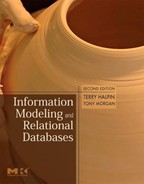1.4. The Relevant Skills
Since relational database systems are dominant, they are the main focus of our implementation discussion, with some attention also being given to XML. Although conceptual interfaces to databases are still in their infancy, developing models at this higher level is more productive and avoids wasting time acquiring knowledge and skills that will rapidly become obsolete. Consider the impact of the electronic calculator on school mathematics curricula (e.g., removal of the general square root algorithm).
Fundamentally, there are two skills that will always be relevant to interacting with an information system. Both of these skills relate to communicating with the system about our particular application area. Recall that the application domain is technically known as the universe of discourse. The two requirements are to:
describe the universe of discourse
query the system about the universe of discourse
The first skill entails describing the structure or design of the UoD and describing its content or population: the structural aspect is the only challenging part of this. Obviously, the ability to clearly describe the application domain is critical if you wish to add a model to the system. Complex models should normally be prepared by expert modelers working with domain experts. The main aim of this text is to introduce you to the fundamentals of information modeling. If you master the methods discussed, you will be well on your way to becoming an expert in modeling information systems.
Issuing queries is often easy using a 4GL, but the formulation of complex queries can still be difficult. Occasionally, the ability to understand some answers given by the system requires knowledge about how the system works, especially its limitations. This book provides a conceptual basis for understanding relational structures and queries, explains the algebra behind relational query languages, and includes a solid introduction to SQL.
No matter how sophisticated the information system, if we give it the wrong picture of our UoD, we can’t expect to get much sense out of it. This is one aspect of the GIGO (Garbage In Garbage Out) principle. Most problems with database applications result from bad database design. This book shows how to model information at a very high level using natural concepts. While providing due attention to popular data modeling approaches such as ER and UML, it also provides an in-depth treatment of the higher level ORM approach.
For immediate use, conceptual schemas can be mapped onto the lower level structures used by today’s database systems. This mapping can be performed automatically using an appropriate CASE tool or manually using an appropriate procedure. This book discusses how to map a conceptual model to a relational database system, as well as to XML schema, and how query languages may be used to retrieve data from such systems. It also provides an overview of other related methods and modern trends.
